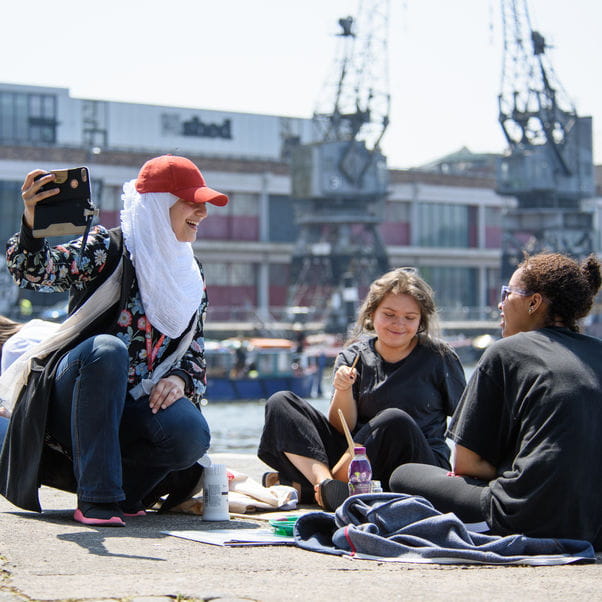Healthy relationships at university
Relationships are meant to make you feel happy. Learn how to cultivate healthy relationships at university and how to recognise problematic patterns.
For many students, university life offers a lot of new experiences, including new relationships.
You will meet new romantic partners, new course mates, flatmates or new friends — as well as experiencing extended time away from old friends, partners or family members. You might also be living abroad for the first time or discovering your identity or sexuality.
Relationships can be complicated. Understanding the foundations of a healthy relationship will help you establish positive connections and ensure you feel comfortable, safe and well supported.
Remember, relationships aren’t meant to make you feel bad. You have the right to be respected, be comfortable and be happy in any relationship.

What makes a good relationship?
The building blocks for a healthy relationship include:
- Respect
- Consent
- Trust
- Communication
- Active listening
Some warning signs of an unhealthy relationship include:
- Lack of respect
- Jealousy and mistrust
- Lack of communication
- Control
- Hostility
- Dependence
- Intimidation or unreasonable demands
Relationship help
What to do if you think you're in an unhealthy relationship
Well done for recognising this. This is often the hardest part! Relationships are meant to make you feel happy. You have the right to want better, be respected, and be comfortable. Here’s some steps to help if you think you’re in an unhealthy relationship:
- If you’re ready to talk, speak to a friend, family member, member of staff or someone you trust about how you’ve been feeling.
- If you feel like you’re in physical danger, call 999 if it is safe to do so. If you’re on campus, dial 9999 from a telephone connected to the University network to reach the campus control room.
- Reach out to one of support services, wellbeing services or book an appointment with our Anti-Sexual Violence Service.
- Contact a helpline or support services, some details are at the bottom of this page.
- Use our report and support tool to flag something that makes you feel upset or uncomfortable.
- Reach out to the Students' Union Advice Centre if you need help finding new halls of residence or private accommodation or email the UWE Bristol accommodation service.
- Build a support network of people you trust and want the best for you.
- Try and regain some independence from the relationship.
- Prioritise your health and wellbeing.
- Don’t let this experience impact other relationships. Think about what went wrong, what you would do differently and what you want new relationships to look like. Create new boundaries or set new expectations for the future in order to maintain your happiness.
How to support someone in an unhealthy relationship
Supporting someone you believe is in an unhealthy relationship should be approached carefully. You may be their only advocate, so try not to force them to do anything or shame them in any way. It is important to remind them that they deserve to feel happy and safe in their relationship and that any form of abuse is not acceptable. Listen to them and their experiences and try and see the whole picture. Let them know you are there for them and they can trust you.
Leaving toxic relationships, ending friendships or making the decision to end contact with family members are all huge, emotional decisions. The person may need time to adjust, come to terms with the situation and even see the scenario the way you do. Help them to seek professional help in the form of local charities, helplines or encourage them to contact UWE Bristol's wellbeing and support services. You’re doing a great thing, well done.
Reflect on your own behaviour
Relationships work both ways. Look inward, reflect and find out more about yourself by considering your own behaviour. Is it conducive to happy and healthy relationships? Are you your best self or have you slipped into problematic behaviours?
There is support available to you if you want help and want to make a change.
Recognising unhealthy relationships
Sometimes it's hard to see the difference between love and control. These videos shine a spotlight on the earliest signs of an unhealthy relationship.
#ThatsNotLove
Such a simple phrase can take on a different meaning in an unhealthy relationship; escalating from a statement of care to one of control.
Disrespect NoBody
Relationships can be amazing, but they can also be tricky. Sometimes, what feels like normal behaviour can actually be unacceptable and when you disrespect someone's body, you disrespect the person too.
External resources
- LoveRespect – LoveRespect is a women’s aid website that helps you to recognise the signs of an unhealthy relationship before they escalate.
- Pegasus – men’s mental and emotional wellbeing advice.
- NHS Domestic Violence support – NHS domestic violence support page.
- Government domestic abuse help – government advice for domestic abuse.
- YoungMinds – tips for dating and building healthy relationships.
Help and advice with relationships

Anti-Sexual Violence Service
UWE Bristol's Anti-Sexual Violence Service provides a non-judgemental, inclusive and confidential safe space for you to seek support if you have experienced sexual trauma of any kind, even if you don’t want to report something.

Report and Support
With Report and Support you can choose to speak with one of our trained advisers, who can discretely investigate incidents or you can report issues anonymously.

Wellbeing
Need somebody to talk to? Between our professional services, external partnerships and the NHS, there is always somebody who can help.
